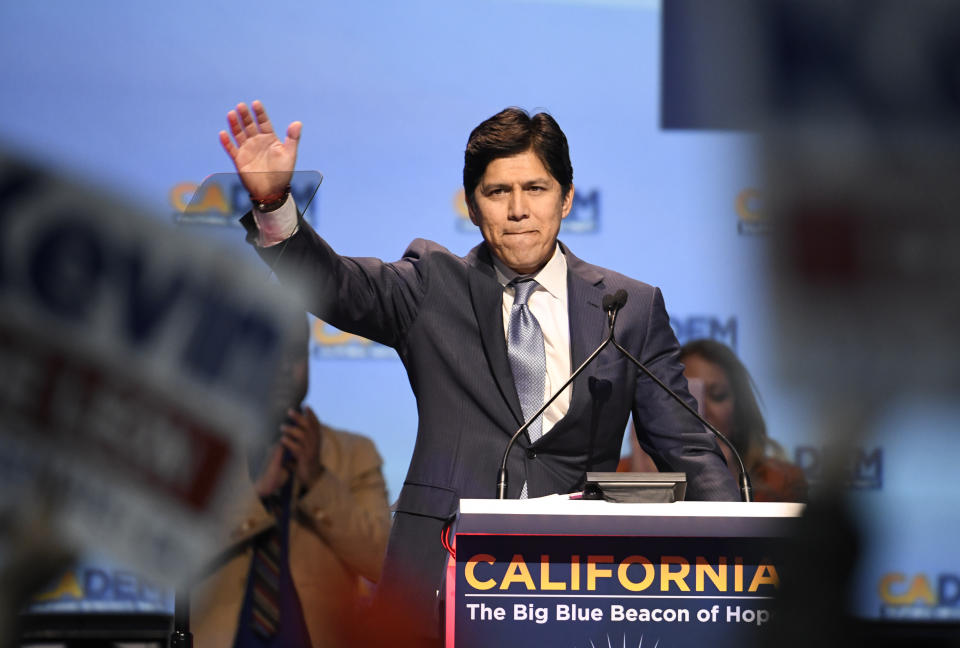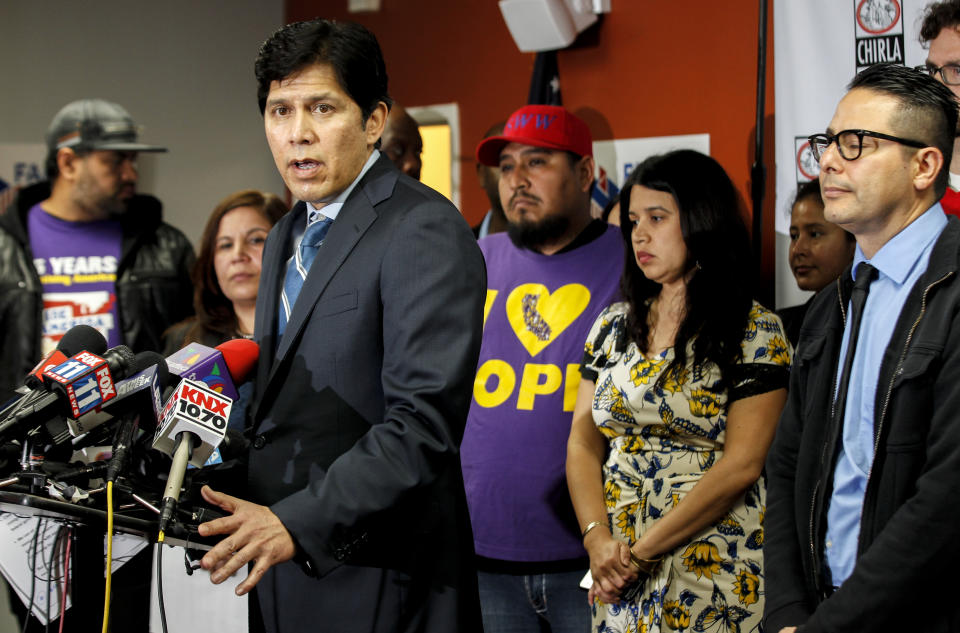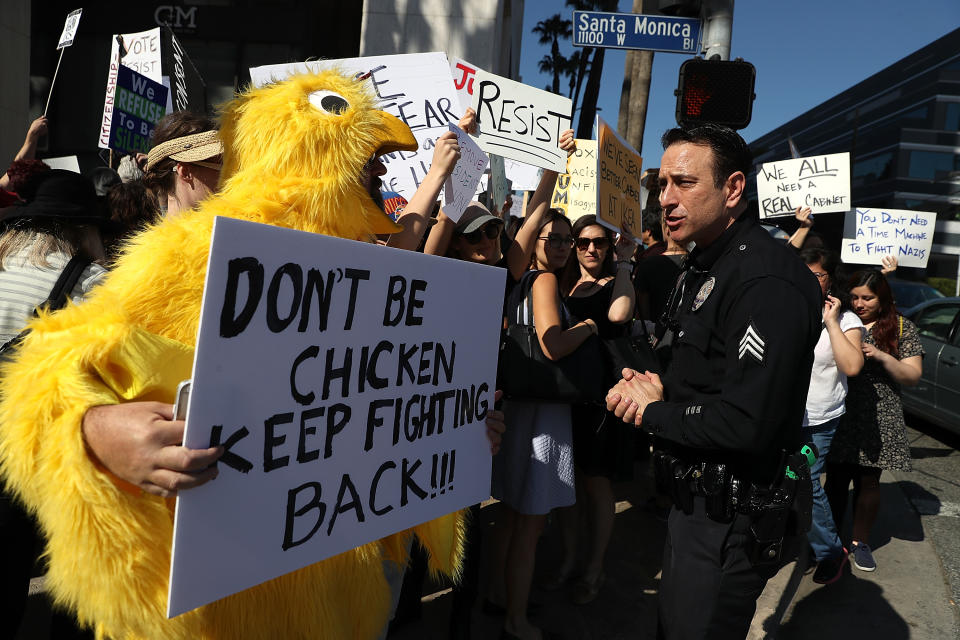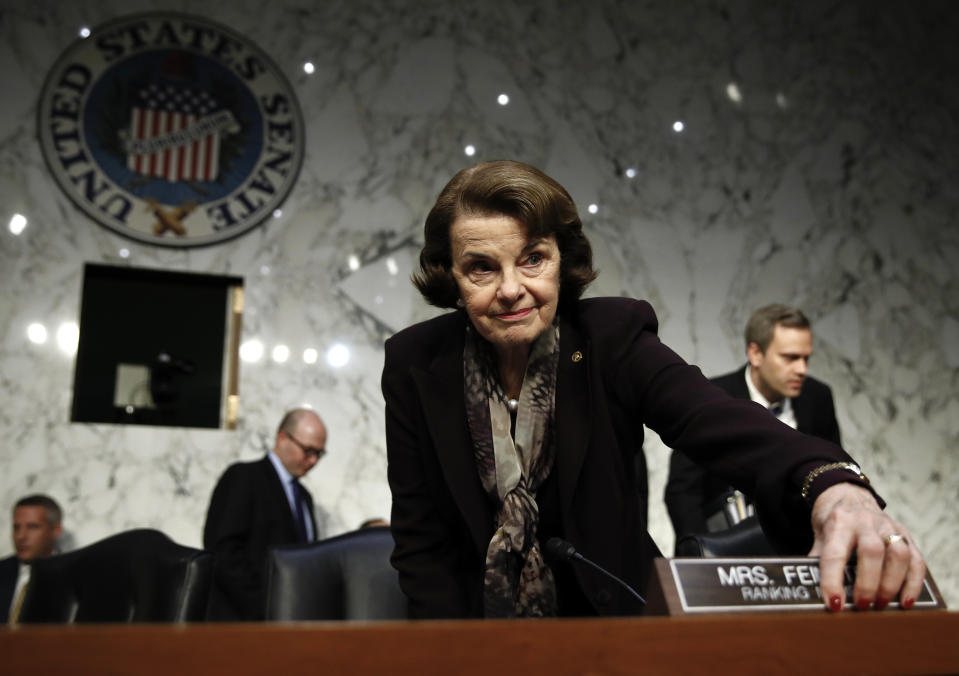Kevin de León takes on Dianne Feinstein from the left

LOS ANGELES — Dianne Feinstein has been the senior United States senator from California for the last quarter-century. She is the first and only woman to have chaired the Senate Rules Committee and the Select Committee on Intelligence. Before joining the Senate, she was the first female mayor of San Francisco; before that, she was the first female president of the city’s Board of Supervisors. In 1994, Feinstein authored the federal assault weapons ban; during President Obama’s first term, she led a groundbreaking investigation into the C.I.A.’s controversial post-9/11 interrogation program.
And yet on Saturday night California Democrats gathered at the San Diego Convention Center and voted not to endorse Feinstein for a sixth term, making her the first incumbent senator in decades to compete in a Golden State primary without the official backing of her party.
Instead, Democratic delegates threw most of their support — 54 percent versus Feinstein’s 37 — to challenger Kevin de León, a Los Angeles politician 33 years her junior with precisely none of her experience on the national stage.
The result wasn’t a total shock, though de León’s share of the vote was bigger than expected. California’s Democratic delegates tend to be progressive activists, and progressive activists, who’ve badmouthed Feinstein’s bipartisan instincts and relatively hawkish foreign-policy views for years, have become especially eager to unseat her since last August, when she refused to call for President Trump’s impeachment, arguing instead that he “can be a good president” if “he can learn and change.” Also worth noting is the fact that de León didn’t secure his party’s endorsement either. For that, he would have needed 60 percent of the vote.

Even so, de León’s strong finish raises an intriguing question: Are Democrats in California — where shifts in American politics tend to happen first — on the verge of tossing out the party’s decorous old guard in favor of a new, more pugnacious generation? Is the so-called resistance a threat not only to Trump & Co., but to Democrats like Feinstein too?
De León certainly hopes so; his entire candidacy is premised on that possibility. President pro tempore of the state Senate since 2014 — he is the first Latino to hold the position since 1885 — he will hit his term limit later this year. With a newly elected senator, Kamala Harris, serving alongside Feinstein; a popular mayor, Eric Garcetti, recently reelected back in Los Angeles; and a 2018 California governor’s race overstuffed with high-wattage contenders, de León is a rising political star with no obvious office to rise into. And so, seizing upon perhaps the only available opportunity, he immediately set about selling himself to a shell-shocked statewide audience in the wake of Trump’s election.
“That night, the night of Nov. 8, I was stunned, just like so many of my fellow Democrats,” de León told Yahoo News shortly before Trump’s inauguration. “But the next morning I got up and got to work.”
By “getting to work,” de León means something very specific: in short, doing whatever possible to transform California into ground zero for the resistance — and to cast Kevin de León, by extension, as one of the movement’s leaders. On Nov. 9, de León and his counterpart in the state Assembly, Anthony Rendon, released a letter proclaiming that California would “lead the resistance to any effort that would shred our social fabric or our Constitution”; in January 2017, they hired former Attorney General Eric Holder to shape their legal strategy.
Ever since, de León is particular has pushed bill after bill designed to thwart Trump’s agenda: SB 54 (aka the California Values Act), which prevents the administration from forcing local police departments to assist in the deportation of undocumented immigrants, thereby transforming the whole of California into a so-called sanctuary state; SB 49 (aka the California Environmental, Public Health, and Workers Defense Act of 2017), which mandates that California enforce environmental and worker protection standards no less stringent than the ones that existed at a federal level before Trump took office; and SB 227 (aka the Protect California Taxpayers Act), which would allow Californians to circumvent Trump’s new caps on certain tax deductions by making charitable donations to the state.

Fifteen months later, de León can credibly claim that he’s done as much as any legislator in the country to oppose the president — and, of course, that’s exactly the claim he’s making on the campaign trail.
“My name is Kevin de León, and I am the president of the most progressive legislative house in America,” he said at the start of Saturday’s convention speech. “We carved it in stone: no matter the place of your birth or the hue of your skin, you can live in California in safety, dignity and, yes, sanctuary.”
Much of the rest of de León’s address was dedicated to drawing what political consultants like to call “contrasts” with his primary opponent.
He didn’t pull his punches. Feinstein, 84, is currently the oldest sitting U.S. senator; if reelected, she will be 91 when her next term concludes. Twice de León mentioned “congressional seniority,” and the implication was lost on no one.
He went on to say that “the days of Democrats biding our time, biting our tongue, and triangulating at the margins are over” — a not-so-implicit rebuke of Feinstein’s measured approach to politics, which the New Yorker once described as “slightly formal in style,” with a faithful adherence “to procedure and protocol” and a belief in “settling disputes privately, by argument rather than by force.”

De León then rattled off all of the insufficiently progressive things Feinstein has done, and that he “would never” do: “I would never oppose card check, and will never vote for school vouchers”; “I would never vote to allow federal agents to spy on American citizens without warrants”: “I would never vote to prosecute 13-year-olds as adults”; “I would never call our country the welfare system for Mexico”; “I would never vote for two different wars lasting 17 years, costing countless American lives and more than five trillion dollars.”
And, lest anyone forget, de León made sure to mock Feinstein’s gentle comments about Trump.
“In your state Senate, Democrats act like Democrats,” he said. “We demand passion, not ‘patience.’ We speak truth to power, and we’ve never been fooled into believing Donald Trump ‘can be a good president.’”
Even beyond the convention hall in San Diego, de León has had some success with this line of attack; two of the state’s most influential unions, the SEIU and the California Nurses Association, previously endorsed his insurgent bid.
In December, Yahoo News followed de León to a series of campaign stops in Orange County and found a candidate convinced that his moment has arrived. Wearing a navy-blue merino sweater, slim gray slacks and a silver Apple Watch, de León appeared at least a decade younger than his 51 years; his impossibly black mop top helped to sustain the illusion. He mixed easily with Democratic regulars at the Plumbers, Steamfitters, Welders & Apprentices local in Orange, where he received a poster-size comic book cover depicting Donald Trump as a tyrannical madman; later, he mingled with young, cosmopolitan Democrats sipping cocktails atop a luxury apartment building in Irvine.
“As God is my witness, I had no intention of running for U.S. Senate at that moment,” de León said of the day Feinstein made her remarks about Trump. “I’m the youngest child of a single immigrant mother who had a third-grade education. I never pined or aspired to be a politician. It’s never been part of my DNA. But I made a decision to send out a press release [criticizing her] that day, and I cannot tell you how many phone calls, how many texts I got, even from members of Congress, who always wanted to say this but were always afraid. I was like, ‘You’re afraid to criticize the obvious? That’s stunning to me.’ And that’s why I made the decision — that we need change, that we need a new voice. Not of the past, but of the present and the future.”

The question now is whether de León can convince California. He may be more in tune with the zeitgeist than Feinstein; he may even be more in tune with the most active California Democrats, who have embraced their new role as Trump’s top antagonists. But ultimately de León’s candidacy could prove to be a case study in the limitations of resistance politics, rather than its power.
Feinstein is formidable, despite her deviations from current liberal orthodoxy. In an ordinary state, de León might have a shot at snatching his party’s nomination away from a moderate incumbent by running to her left in the primary. But California has a nonpartisan primary system, which means the top two finishers — likely Feinstein and de León — will advance to the general election regardless of which of the two gets more votes on June 5th. After that, moderation tends to be a plus, not a minus.
Meanwhile, Feinstein has rustled up $13 million for her reelection; de León has raised $434,000. The latest statewide poll shows her ahead by 29 percentage points (46 percent to 17 percent), up from 24 points in November. De León is fighting like mad to raise his profile, and more cash. But so far, he has only slipped further behind.
All of this is symptomatic of a larger reality: Feinstein may not be popular among self-styled resistance fighters, but how many resistance fighters are there, really — even in California? And how many are just as upset about moderate Democrats as they are about Trump Republicans? Enough to unseat a trailblazing woman who has been serving the state for decades and who won reelection in 2012 with more votes (7.75 million) than any other senator in U.S. history? Enough to replace her with a largely unfamiliar legislator who presided over the state senate during a sweeping sexual-harassment scandal?

Recently, Feinstein has started speaking out more forcefully against Trump. In January, she took the “extraordinary step” of releasing a key transcript from the Senate Judiciary Committee’s Russia probe without the Republican chairman’s approval, earning a nickname from the president in the process: “Sneaky Dianne.”
“I think what we’re beginning to see is the putting together of a case of obstruction of justice,” she said in December.
Whether such boldness is a political gambit meant to neutralize de León is difficult to say. But either way, it serves to remind Californians that seniority has its advantages.
“To say you would come in as a rookie and be more forceful against Donald Trump than Dianne Feinstein means people are going to care about what the hell you say, because what you do will be marginal,” Bill Carrick, Feinstein’s longtime strategist, tells Yahoo News. “You want to have an influential United States senator? Dianne Feinstein is the ranking member on the Judiciary, where she can actually do something to stop these judges who are outside the mainstream. On the Intelligence Committee, she’s a senior member investigating President Trump, particularly on Russian interference. And on the Judiciary Committee she’s investigating obstruction of justice. It’s campaign rhetoric versus reality. And it’s pretty preposterous.”
Anyone following the California Senate race should expect to hear more of this from Feinstein in the months ahead. It’s a canny point: that resistance can take many forms, and that a quieter, more traditional approach may still be more effective. Unless de León can prove otherwise, he won’t be able to repeat his San Diego upset in November.

_____
Read more from Yahoo News:
House Democrats seek 20 to 30 more witnesses in Russia probe, but GOP resists
Jefferson’s ‘tree of liberty’ and the blood of schoolchildren
Author Eric Metaxas, evangelical intellectual, chose Trump, and he’s sticking with him
Meet the teen girl behind the National School Walkout movement
Photos: Chris Hondros’s life and pictures highlighted in documentary ‘Hondros’


